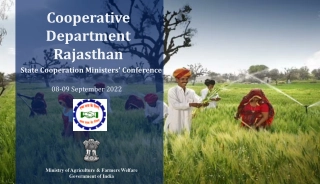Understanding Cooperative and Organization Management
Cooperative and organization management involves the autonomous association of people working together to meet common economic, social, and cultural needs. The unique characteristics of cooperatives include autonomy, volunteerism, common needs, ownership, democratic control, and enterprise. Cooperatives aim to achieve objectives such as economies of scale, poverty reduction, employment creation, gender equality, youth empowerment, and business development through their collective efforts.
Download Presentation

Please find below an Image/Link to download the presentation.
The content on the website is provided AS IS for your information and personal use only. It may not be sold, licensed, or shared on other websites without obtaining consent from the author. Download presentation by click this link. If you encounter any issues during the download, it is possible that the publisher has removed the file from their server.
E N D
Presentation Transcript
Cooperative and organization management
Chapter 1:Introduction Chapter 1:Introduction 1.1. Concept of cooperatives A cooperative is an autonomous association of persons united voluntarily oto meet their common economic, social, and cultural needs and aspirations through a jointly-owned and democratically controlled enterprise . The word cooperative is derived from the word cooperate omeans to work or act together or jointly for a common purpose or benefit.
In this definition, the following points highlight the unique characteristics required for an enterprise to be classified as a cooperative enterprise: Autonomous - Independence and organization base of the enterprise; Volunteerism - Open membership; Common needs People come together to fulfil a mutual need; Ownership - Members are owners (not merely customers or workers) of the enterprise and should invest wisely in its growth; Democratic control - Each member is given a single vote regardless of contribution/wealth; Enterprise - A cooperative is not only an association of people, but also a business enterprise.
1.3. Objectives and Benefit of cooperatives a) Economies of scale b) Contributing to poverty reduction c) Employment creation d) Gender equality e) Youth empowerment f) Business development
a) Contributing to poverty reduction Cooperatives can be effective in reducing poverty because: they provide common services which would have been costly if carried out by individual members, if they operate efficiently they provide goods and services at competitive prices, thus saving the member some money, some cooperatives provide credit to members which enable them to improve production and increase their incomes, and the returns accruing from the cooperative business revert to members either in cash or in kind.
C) Employment creation Cooperatives help create employment with employing million of people around the world. Producer, Consumer or Worker cooperatives have demonstrated capacity for creating jobs in their respective economies. d) Gender equality Cooperatives provide a voice and a vehicle for economic opportunities for women otherwise disenfranchised and provided with few opportunities to break the cycle of poverty. Cooperatives are sometimes the only avenue for women to gain education and training in order to create employment opportunities and raise the standard of living for themselves and their families.
e) Youth empowerment Cooperatives provide essential life skills by teaching and engaging young people on topics such as money management, the importance of savings, and the power of compound interest. They also learn about important values and principles including democracy, inclusion, honesty and fairness. Cooperatives help shape and prepare global leaders of tomorrow.
f) Business development Cooperatives provide opportunities for very ordinary people to engage in business activities people who, as individuals, would never have been able to do so due to real economic costs. Participation in the cooperative pool enables them to reap economic benefits and to acquire new knowledge and skills in marketing, production, understanding financial statements, organization and leadership which they can apply in their private and other business lives.
Chapter 2:Evolution of cooperatives Chapter 2:Evolution of cooperatives 2.1. Cooperative development in the world Cooperation means living, thinking & working together. Right from the hunting age up to the present day the progress of human being in all spheres, social, economic, religions and political is marked by sense of thinking, working & living together. As Margaret Digby clearly stated; Association in work as well as in play is natural to man, and that at a very early stage, mutual aid had extended beyond the family group and taken, on an organized and fairly permanent form . But the present development of cooperative is not achieved over night that there has been gradual development of the forms and workings of cooperation from time to time as it is discussed below.
2.2. Cooperative development in Ethiopia Ethiopia is known as a country with diversified nationalities. Each nation has its own unique culture and custom of living. The system of living is in cooperation that means; they work in group, habits of mailing commonly and living together in the nearby villages that contribute to the development of the society. There are three well known forms of traditional cooperatives. These are: Edir, Ekub, Debo.
Edir is one of the traditional forms of cooperatives still operating almost in all urban and rural areas of Ethiopia. Almost the majority of the people especially heads of a particular family are member of this Edir. The main objective for the establishment of this form of association (Edir) is to help a family who is the member of Edir in case of getting sorrow (Especially, when a family loses one of its members by death).
Edir shares a lot of similarities like: voluntary membership, democratic control and administration, fair and equal payment of compensation for a family whose members is died and participation of each member in accordance with the bylaws of that particular Edir with modern form of cooperative. Member participation is very high in Edir because its foundation is based up on the willingness of members. Edir is ranking first, of all others form of traditional association in participating large classes of the people.
Ekub is the other traditional form of cooperative which is formed based on classes of men with identical (similar) earning. Any community of people who do not have permanent earning to the extent of people with high earning can form Ekub . Ekub is too similar to modern saving and credit societies but it does not bear interest on the money saved and the data about the amount of money saved through this form of associations is not supported with evidence.
The deposits of money in Ekub as a saving could be on daily, weekly or monthly basis and the cumulative of money being saved is refund back to members in turn basis. The member can solve his immediate economic and social problem with the money being paid. Until now, there is no/ little effort made to use this money in economic development of the country.
Debo (Wenfal) is still another form of traditional form of cooperation. This is mainly a cooperation formed at rural areas where most of the people are farmers. Although, debo do not have a system of administration like other form of association, it is based on equivalent labour contributed by each farmer. Debo is a system of farmer s cooperation during the time of farming, weeding and harvesting. It is a mechanism by which all farmers helping each other on turn basis. Since each types of work are being done in time, the productivity per farmers can be increased.
Generally, these three traditional form of association which are the values and customs of our society should be brought to modern form.
Modern cooperative development in Ethiopia Modern form of Cooperatives was started in Ethiopia during the ruling era of Emperor Haileselassie I in 1960 where the first legislative called Farm workers Cooperative decree Number 44/1960 was declared. Under this new legislative the governments had planned to establish 20 Cooperatives but of these only 4 Cooperatives were formed. They were established to address unemployment, immigration from rural to urban and land tenure questions from different directions.
At the beginning of the era of Derg, the government issued a land reform proclamation followed by another proclamation on the formation of peasant Associations. The peasant associations were given legality by Proclamation No. 71/1975. In this proclamation, the objectives, powers and duties of peasant associations, service Cooperatives were clearly stated. It was during this time that a number of Ye irshaMahber was unwillingly organized in most of the then provinces.
The Proclamation No. 138/1978 was issued later in order to include other types of Cooperatives like Housing, Thrift and credit and Handicrafts etc. All the efforts made to restructure the Cooperative movement based on these proclamations were essentially geared towards direct control of Cooperative and turning them into government and political rather than socio economic development instruments that leads to failure of large proportion of the cooperatives established.
After the downfall of the Derg regime, there was a gap in between 1991-1995 in Cooperative movement of Ethiopia. Later, due to Cooperative experts dedication and devotion, and the government s commitment towards Cooperative development, it became necessary to enact new Cooperative proclamation which suits to the current economic system and the agricultural Cooperative society s proclamation No.85/1995 was issued. The proclamation was however, meant to serve only agricultural Cooperatives.
Other types of Cooperatives had no chance (legal ground) to adjust themselves to the newly created environment. Finally cooperative society s proclamation No 147/1998 was issued in 1998 which was followed by Amendment proclamations No. 402/2004, 106/2004. Hence, there have been significant improvements in the cooperative movement in Ethiopia.
Chapter 3: Chapter 3: P Principles and Values of rinciples and Values of cooperatives cooperatives 3.1. Principles of cooperatives The term principle , derived from the Latin word Principium meaning basis has different meanings: the primary idea, a certain thesis, a rule of an organization. The International Co-operative Alliance (I.C.A) Commission (1966) on Cooperative Principles faced the problem of defining the term principle . The working definition adopted by the Commission was: those practices which are essential, that is, absolutely indispensable to the achievement of the Cooperative Movement s purpose .
There were different principles adopted by cooperatives at different times the most popular ones include Rochdale principles, Raiffessen principles and Schulze-Delitsch principles developed during their respective times. But the currently applied principles are developed by ICA. At the Vienna Congress of the I.C.A., in 1930, the Central Committee was asked to appoint a Special Committee to examine the conditions in which the Rochdale Principles were applied in the member countries and to state these principles in their final form. This special Committee was formed in 1934 at the London Congress of the I.C.A. The Paris Congress of the I.C.A. approved its report entitled The Present Application of the Rochdale Principles of Cooperation in 1937.
Since the initial adoption in 1937, the ICA has revised the principles twice once in 1966 and once in 1995. These changes were inevitable in the middle of struggling with the changing socio-economic environment and trying to keep the cooperative relevant in a competitive economy. Accordingly, the principles could be changed in the future whenever need be. The definition, principles and values of cooperatives adopted by 1995 are discussed here under.
A cooperative is an autonomous association of persons united voluntarily to meet their common economic, social and cultural needs and aspirations through a jointly owned and democratically controlled enterprise (ICA, 1995) Cooperatives are based on the values of self-help, self-responsibility, democracy, equality, equity, and solidarity. In the tradition of their founders, cooperative members believe in the ethical values of honesty, openness, social responsibility, and caring for others.
Principle of Voluntary and Open Membership cooperative is open to all persons who need and are able to use the services of cooperatives and willing to accept the responsibilities of membership without any artificial discrimination. Like gender, social, racial, political or religious. But where cooperatives are for specific purpose, e.g., housing, there may be understandable and acceptable reasons why cooperative may impose a limit on membership. Willing to accept responsibilities of membership, reminds members that they have obligations to their cooperative.
Principle of Democratic Member Control Cooperatives are democratic organizations controlled by their members who actively participate in setting their policies and making decisions. Men and women serving as elected representatives are accountable to the membership. In primary cooperatives members have equal voting rights by virtue of the one member, one vote rule; cooperatives at other levels are also organized in a democratic manner.
Principle of Member Economic Participation Members contribute equitably and democratically control the capital of their cooperative. At least, part of that capital is usually the common property of the cooperative. Members allocate surpluses for any or all of the following purposes: developing their cooperative, possibly by setting up reserves, part of which at least would be indivisible; and supporting other activities approved by the membership.
Principle of Autonomy and Independence Cooperatives are autonomous, self-help organizations controlled by their members. If they enter in to agreements with other organizations, including governments, or raise capital from external sources, they do so on terms that ensure democratic control by their members and maintain their cooperative autonomy.
Principle of Educations, Training and Information Cooperatives provide education and training for their members, elected representatives, managers and employees so that they can contribute effectively to the development of their cooperatives. They inform the general public speech, particularly young people and opinion leaders, about the nature and benefits of cooperation.
Principle of Cooperation among Cooperatives Cooperatives must also recognize the necessity of strengthening their support organizations and activities. It is crucially important for different kinds of cooperatives to join together when speaking to government or promoting the cooperative way to the public. In order to build an integrated cooperative system it is necessary that cooperatives should cooperate among themselves. They should not compete with their own constituent members.
Principle of Concern for Community Cooperatives serve their members most effectively and strengthen the cooperative movement by working together through local, national, regional and international structures. Cooperatives work for the sustainable development of their communities through policies approved by their members.
3.2. Values of cooperatives Self-help Self-responsibility Democracy Equality Equity Solidarity Honesty Openness Social Responsibility Caring for others
Self-help: It means one should try to solve his problems with his own efforts, means and resources available. But self-help succeeds only up to a point. Therefore, it needs joint- efforts with those who have the same problem. They can pool small resources and means, so that they become more potential. Self-responsibility: coupled with self-help and mutual self- help is the value of self-responsibility. Every office-bearer, member and member of management must take responsibility for his personal actions, for the activity as whole and for its impact on society.
Democracy: Democracy is a basic value of cooperatives. In the context of cooperatives, the essence of democracy is conscious decision based on freewill . Conscious decision means understanding the logic or rationale of taking decisions and be aware of the possible consequences of the decisions and their impact on individual and institution. Equality: Equality means equal right and opportunities, right of participation, a right to be informed, a right to be heard, a right to be involved in the decision making. Members are to be associated as equal as possible, without any kind of discrimination of gender, religion, caste, creed, race, amount of share capital contribution, deposits, political affiliation etc.
Equity: It refers to how members are treated within a cooperative. It means that members should be treated equal in how they are rewarded for their participation in the cooperative normally through patronage dividends, allocations to capital reserves in their name or reductions in charges. Equity ensures social justice. Solidarity: It is an important base of cooperatives. Solidarity is collectivity. Management have the responsibility to ensure that all members are treated as fairly as possible, that the general interest is always kept in mind, that there is consistent effort to deal with employees (members or non- members), as well as the non-members. It also means that a cooperative has a responsibility for the collective interest of its members.
Honesty: Cooperatives ideal is honest dealing with members and non-members. They regularly reveal to their members and others information relating to their performance. Scope of honesty in cooperatives refers to monetary honesty, honesty of thoughts, commitments, behavior and conduct, no hypocrisy or falsehood, no underhand dealings or false promises, no dishonesty in elections. It also encompasses correct maintenance of accounts and balance sheet, correct information to members, objectivity and fairness in personal matters.
Openness: It means that cooperatives are open to members of community they serve. They have a commitment to serve and assist individuals in helping themselves. Social Responsibility: In fact Social Responsibility and caring for others are overlapping concepts. It means that cooperatives should move beyond caring for members only. They should financially assist or organize activities beneficial to the entire community. However, such activities can be taken up when cooperatives have surplus. Caring for others: this value of cooperatives refers to taking interest in and care about other people. This concept stems from humanism. Cooperatives are humane by nature though their main concern is to achieve























